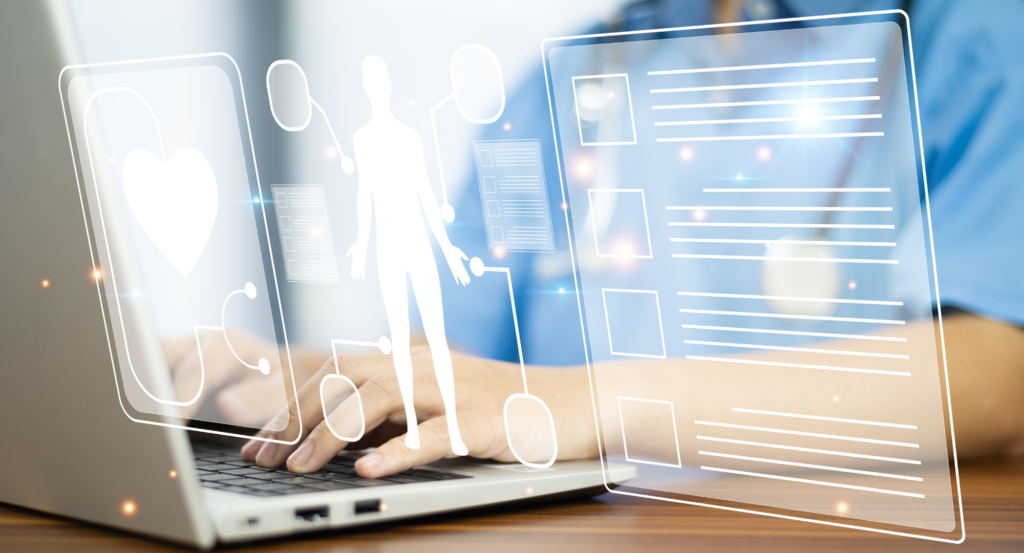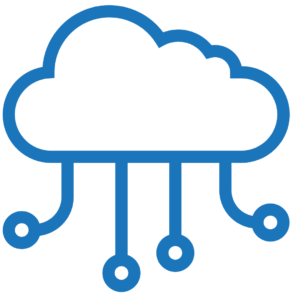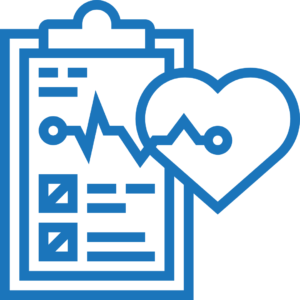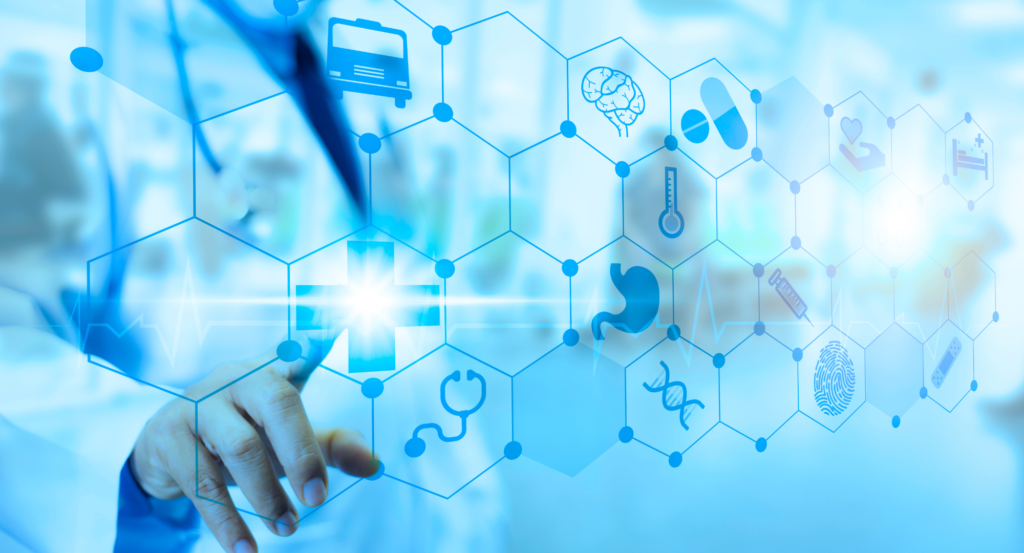There has been a push for adding capability, and efficiencies, by moving to the Cloud. This can be fairly simple for most organizations but has added complexity for those in the fields of healthcare, pharmaceuticals, research, and medical appliances. The advantages far outweigh the challenges; with the assistance of the right technology advisor, you can add the best solution(s) and Providers to help you increase your customer satisfaction – advancing your ability to offer your core service. We can help you with everything from file digitization to Cloud adoption to working with data and IoT devices.
Many organizations have siloed systems; data (extensive EHR – Electronic Health Records, diagnostics, processes) and legacy solutions. Scattered on-premises systems are increasingly slow and cumbersome, making it difficult to integrate with other systems. These systems are also unable to keep pace with the ease, flow, and Connectivity of Cloud applications.
Why You Should Move to The Cloud
Discover what benefits the cloud can offer your organization.
Cloud-Based Platforms Can Help Create Cost Savings.
There are often no up-front costs – instead of purchasing hardware and servers outright, your organization pays for the resources actually used. You also won’t need to allocate the physical space (on-premises) or the IT staff to support them. This can mean massive cost savings and a higher standard of support.
Integration, Interoperability, and Scalability. Your tech stack, which may include large specialized legacy equipment, is an investment that you’re still earning a return on. Cloud Providers are familiar with integrating these legacy devices, plus they can also promote shared systems – allowing the seamless transfer of data between different stakeholders, improving outcomes, and introducing efficiency.
Shift to “Patient Centric” Models. Consumers are demanding more visibility for their own interests – access to their records, less friction (with insurance, self-scheduling, etc.) during the process, and more self-directed personalized care. The advances of health services and wearables are presenting additional valuable diagnostic, expanded access, and improved experience opportunities.
Reallocate Time and Energy from Maintenance to Innovation. When you remove the constant need to support and maintain systems, you are free to look for new ways to better serve customers (patients) and your own organization. This could range from app to IoT/automation developments including health wearables and AI-assisted diagnostics which are positioned to make a huge impact.

Heightened Compliance Alignment. Healthcare data and related applications need to comply with several information/data regulation laws including HIPAA, HITECH, and GDPR; required standards like ISO 27001 and SAS 70; plus, guidance from organizations like the Cybersecurity and Infrastructure Security Agency and the National Institute of Standards and Technology. That’s a lot to consider and a huge liability if not kept up to date.
Added Cybersecurity Potential. Cloud Systems afford
a higher level of oversight, updates/upgrades, and precautionary measures. Encryption of data, use of security keys for access, and using blockchain for securing data are some of the ways organizations can ensure the security of sensitive data stored in the Cloud. Remove this burden from your in-house IT staff, and open up access to specialized IT professionals/ Cybersecurity experts for more targeted activities.
Big Data, Powerful Analytics. Analytics and Artificial Intelligence algorithms on Cloud-stored (patient) data can power medical research, improve patient treatment options, enable oversight formulating individual personalized care plans for patients, and lead to better decision-making. Processing and accessing large datasets are now feasible and functional. It can also ensure that all pertinent patient details are on record, with nothing missed when prescribing treatments.
Perceived Roadblocks
Digitization of Files/Records. The upfront cost of digitizing years’ worth of (medical) data is time and cost intensive. Different information (e.g., prescriptions, x-ray, scans, lab results, proprietary designs, successive trials) needs to be stored and input differently, increasing the time-intensive nature of the task. The current way this information is siloed often making it difficult to access, removing the value of the asset. For example, AI screening of mammograms can identify areas of concern and track changes over multiple scans, a procedure that often doesn’t occur with a human-only approach. The ability to utilize data, long-term, with smart systems has the potential for better treatment, heightened insights, and cost savings.
Large-Scale Technical Infrastructure. Much of the needed technology structure in the healthcare industry already exists. Individual industry participants can try to build their own infrastructure, or they can use the many existing models that would provide the required support they need. All while being security accessible across the country or around the world! Many oof the questions about building a large, connected database have already been resolved with solutions that organizations can readily acquire.
Legal Rights for Data and Privacy. Laws about the internet, Cloud computing, and health data are changing all the time, without consistency or standard between nations or regions. International agreements on healthcare privacy and how to hold Cloud systems to an international standard haven’t been set yet. Taking a Cloud approach will allow you to have more flexibility, and adopt/set standards as they become known or needed!
Centralized Storage Security Advantages. When medical data is stored in a centralized location, one that works with many connected parts, you may think that security becomes more difficult, when in reality, the opposite can be true. Centralized systems mean tasks require less time/effort. Updates/upgrades for hardware and software often happen more frequently and with less cost. Procedures and processes are more defined and held to a higher standard. You can even gain access to more specialized IT Cybersecurity specialists for
your entire network – plus, you can identify and reduce the attack surface that makes your information and network vulnerable.
Move to the Cloud, Provide Huge Improvements for Your Organization

The impact of individual technology, like EHR (Electronic Health Records), Patient Portals, and AI/ML-assisted diagnostic testing is already making a positive and ground-breaking impact on the healthcare, pharmaceutical, research, and medical appliance industry. Cloud lets you unite everything together, heightening the utility of available information, introducing efficiency/ security/flexibility to scale, and providing a reliable cost structure that can result in crucial budget savings.
Tech Experts Who Understand the Healthcare Space
Our team has experience working with organizations like yours. From getting more value from your data to file digitization to the obstacles of introducing smart/IoT solutions; we understand your concerns and know how to find the right solution(s) to best meet your needs/requirements. As vendor-agnostic technology advisors (with access to over 200 tech Providers) we will work with you, your legacy solutions, budgets, and timelines to achieve the outcomes you want, because we work for you!

About Us
With hundreds of relationships across the industry’s top providers, TelEnergy is the go-to resource to start your technology journey. TelEnergy provides full-service consultancy services, offering insight and experience to support technology teams and help them navigate the changing landscape.
We follow a 10-point process to deliver excellence through consulting, engagement, and execution, all supported by data-driven insights that help you make the right decisions for your technology needs the first time.
